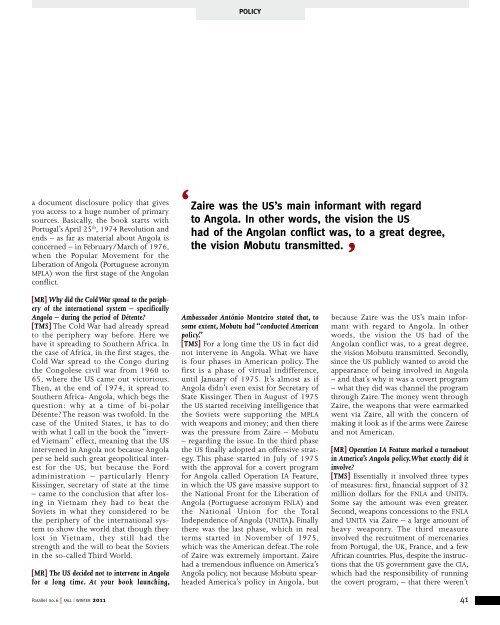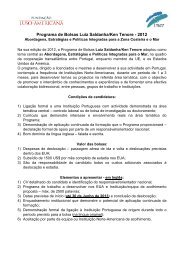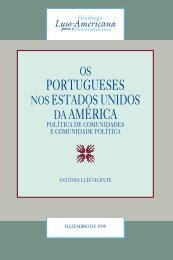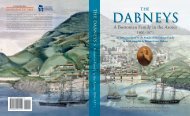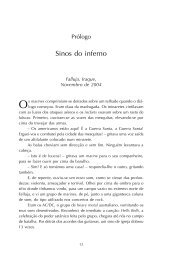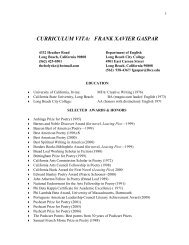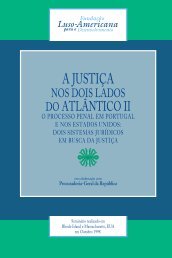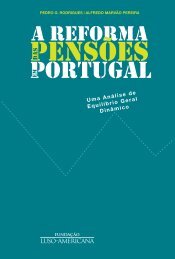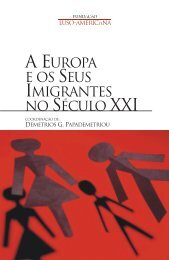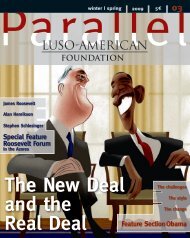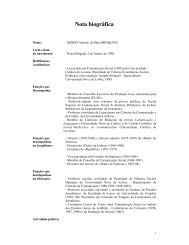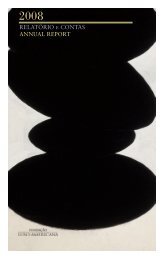A decade later - Fundação Luso-Americana
A decade later - Fundação Luso-Americana
A decade later - Fundação Luso-Americana
Create successful ePaper yourself
Turn your PDF publications into a flip-book with our unique Google optimized e-Paper software.
a document disclosure policy that gives<br />
you access to a huge number of primary<br />
sources. Basically, the book starts with<br />
Portugal’s April 25 th , 1974 Revolution and<br />
ends – as far as material about Angola is<br />
concerned – in February/March of 1976,<br />
when the Popular Movement for the<br />
Liberation of Angola (Portuguese acronym<br />
MPLA) won the first stage of the Angolan<br />
conflict.<br />
[MR] Why did the Cold War spread to the periphery<br />
of the international system – specifically<br />
Angola – during the period of Détente?<br />
[TMS] The Cold War had already spread<br />
to the periphery way before. Here we<br />
have it spreading to Southern Africa. In<br />
the case of Africa, in the first stages, the<br />
Cold War spread to the Congo during<br />
the Congolese civil war from 1960 to<br />
65, where the US came out victorious.<br />
Then, at the end of 1974, it spread to<br />
Southern Africa- Angola, which begs the<br />
question: why at a time of bi-polar<br />
Détente? The reason was twofold. In the<br />
case of the United States, it has to do<br />
with what I call in the book the “inverted<br />
Vietnam” effect, meaning that the US<br />
intervened in Angola not because Angola<br />
per se held such great geopolitical interest<br />
for the US, but because the Ford<br />
administration – particularly Henry<br />
Kissinger, secretary of state at the time<br />
– came to the conclusion that after losing<br />
in Vietnam they had to beat the<br />
Soviets in what they considered to be<br />
the periphery of the international system<br />
to show the world that though they<br />
lost in Vietnam, they still had the<br />
strength and the will to beat the Soviets<br />
in the so-called Third World.<br />
[MR] The US decided not to intervene in Angola<br />
for a long time. At your book launching,<br />
poLicy<br />
‘ Zaire was the us’s main informant with regard<br />
to Angola. in other words, the vision the us<br />
had of the Angolan conflict was, to a great degree,<br />
the vision mobutu transmitted.<br />
’<br />
Ambassador António Monteiro stated that, to<br />
some extent, Mobutu had “conducted American<br />
policy.”<br />
[TMS] For a long time the US in fact did<br />
not intervene in Angola. What we have<br />
is four phases in American policy. The<br />
first is a phase of virtual indifference,<br />
until January of 1975. It’s almost as if<br />
Angola didn’t even exist for Secretary of<br />
State Kissinger. Then in August of 1975<br />
the US started receiving intelligence that<br />
the Soviets were supporting the MPLA<br />
with weapons and money; and then there<br />
was the pressure from Zaire – Mobutu<br />
– regarding the issue. In the third phase<br />
the US finally adopted an offensive strategy.<br />
This phase started in July of 1975<br />
with the approval for a covert program<br />
for Angola called Operation IA Feature,<br />
in which the US gave massive support to<br />
the National Front for the Liberation of<br />
Angola (Portuguese acronym FNLA) and<br />
the National Union for the Total<br />
Independence of Angola (UNITA). Finally<br />
there was the last phase, which in real<br />
terms started in November of 1975,<br />
which was the American defeat. The role<br />
of Zaire was extremely important. Zaire<br />
had a tremendous influence on America’s<br />
Angola policy, not because Mobutu spearheaded<br />
America’s policy in Angola, but<br />
because Zaire was the US’s main informant<br />
with regard to Angola. In other<br />
words, the vision the US had of the<br />
Angolan conflict was, to a great degree,<br />
the vision Mobutu transmitted. Secondly,<br />
since the US publicly wanted to avoid the<br />
appearance of being involved in Angola<br />
– and that’s why it was a covert program<br />
– what they did was channel the program<br />
through Zaire. The money went through<br />
Zaire, the weapons that were earmarked<br />
went via Zaire, all with the concern of<br />
making it look as if the arms were Zairese<br />
and not American.<br />
[MR] Operation IA Feature marked a turnabout<br />
in America’s Angola policy. What exactly did it<br />
involve?<br />
[TMS] Essentially it involved three types<br />
of measures: first, financial support of 32<br />
million dollars for the FNLA and UNITA.<br />
Some say the amount was even greater.<br />
Second, weapons concessions to the FNLA<br />
and UNITA via Zaire – a large amount of<br />
heavy weaponry. The third measure<br />
involved the recruitment of mercenaries<br />
from Portugal, the UK, France, and a few<br />
African countries. Plus, despite the instructions<br />
that the US government gave the CIA,<br />
which had the responsibility of running<br />
the covert program, – that there weren’t<br />
Parallel no. 6 | FALL | WINTER 2011 41


